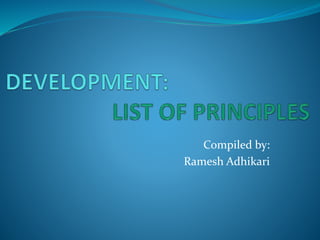
Development Principles Explained in 17 Points
- 2. 1. Development is a process not a program. Development is not the result of a set of policies or programs. It is the result of a process by which society moves from lesser to greater levels of energy, efficiency, quality, productivity, complexity, comprehension, creativity, enjoyment and accomplishment.
- 3. 2. The process of development occurs by the creation of higher levels of organization in society capable of accomplishing greater acts with more efficient use of social energies. Society develops by organizing all the knowledge, human energies and material resources at its disposal to fulfill its aspirations. Organization is the practical application of knowledge in action. It is the technology or know-how for social accomplishment.
- 4. 3. Political, social, economic and technological development are various expressions and dimensions of the development of the human collective. The same principles of development are application to all fields of social existence.
- 5. 4. The same principles are applicable to development at the level of the individual, the organization and the society.
- 6. 5. A society is prepared for development when it possesses the requisite surplus energy, awareness and aspiration.
- 7. 6. Surplus energy is the fuel for development. Each developmental achievement requires an enormous investment of energy in new and higher forms of behavior. Surplus energy is generated when society has fully organized and mastered activities at its current level of development. The development and application of mind energize society by technological and organizational innovation, spread of education, acceptance of new ideas and higher values.
- 8. 7. Energy is released when society becomes aware of new opportunities and has the collective will to exploit them. The driving force for development is the progressive growth of the social collectives’ knowledge and awareness of opportunities and the social aspiration or will for higher accomplishment.
- 9. 8. The social organization consists of a single interconnected fabric. The threads and the weave of the fabric are formed by the multidimensional interaction of social activities, organizations, institutions and values. The fabric varies in thickness and density of weave, being most concentrated in large, highly developed urban centers. Development is the process by which the fabric of the social organization increases in density, quality, complexity, and geographic extension.
- 10. 9. Society develops through the three overlapping stages – physical, vital, and mental. Each stage is characterized by the predominance of one of the three attributes of human consciousness. The progression from one stage to the next stimulates an exponential increase in the productivity and accomplishments of society.
- 11. 10. The natural process of development is unconscious. It proceeds by a slow, cumbersome, trial and error process from experience to knowledge. Conscious development moves in the other direction from knowledge to experience. The more conscious the process, the more rapid the progress. Education is an essential prerequisite for conscious development.
- 12. 11. The society gives formed creative expression to its collective subconscious urge for development through the initiative of pioneering individuals.
- 13. 12. The response of society to the initiative of the pioneer depends on its prior preparedness. Initiatives that are too far beyond the society’s preparedness are opposed, rejected or ignored. These pioneers are considered rebels. Those that embody the next step in the collective march are embraced, often after initial resistance, imitated and eventually accepted by the collective. These pioneers are accepted as leaders.
- 14. 13. Once a new activity is accepted, society established new organizations, policies and laws to support it. When social acceptance of the activity becomes complete, the activity matures into an institution that no longer requires the support of specialized organizations, policies and laws to promote it. At a further stage the activity is transmitted to future generations through the family and becomes part of the culture of the society.
- 15. 14. When society seeks to move to the next higher stage of development, existing beliefs, attitudes, behaviors and forms of organization become obstacles that have to be overcome in order for the transition to take place. Progression to each further stage involves a change in attitude and life style.
- 16. 15. The speed of social development increases as awareness of opportunities spreads, aspiration increases, conscious knowledge of organization grows, attitudes become more progressive, and infrastructure is put in place.
- 17. 16. Development takes place on the foundation of four types of infrastructure – physical, social, mental and psychological. Only the first of these is subject to any inherent limits. As development progresses, it relies more and more on non- material resources.
- 18. 17. Resources also are of four types – physical, social, mental and psychological.
- 19. 18. Mind is the creator of all resources. The application of human intelligence and inventiveness converts a substance into a resource. Increasing knowledge increases the productivity of resources, even physical resources. Therefore, mind is the ultimate resource that gives value to all the others.
- 20. All development reduces to the development of human beings. The continued growth in the capacity of human beings to conceive, design, plan, allocate, systematize, standardize, coordinate and integrate actions, systems, organizations and knowledge into larger, more complex and productive arrangements is responsible for the process of social development.
- 21. THANK YOU
